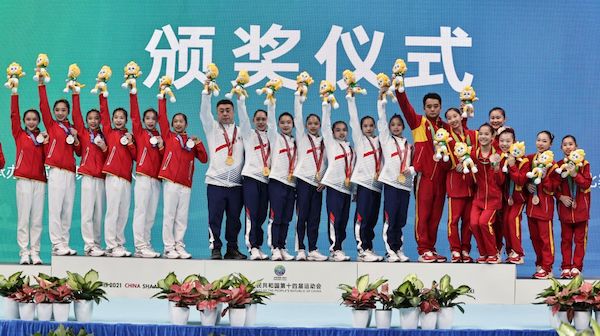
The team final competitions at China’s National Games wrapped up earlier today with the women from Guangdong taking the title with a 217.129, more than four points ahead of Anhui, the closest challenger with a 212.961.
A day earlier, the men from Jiangsu won their competition with a 338.960, just one one-thousandth lower than their qualification score of 338.961, and about four tenths ahead of Hunan, which took the silver with a 338.561.
Guangdong – featuring 2020 Olympian and top all-around qualifier Ou Yushan along with 2018 world beam champion Liu Tingting and top up-and-comers Luo Rui, Sun Xinyi, Wu Ran, and Bi Qingqing – had a fantastic day despite being at a difficulty disadvantage on vault, where Sun’s 13.6 was the top score for the team. The women finished first on the remaining three events, though, with highlights being a 14.5 from Luo and a 14.466 from Liu on bars, a 14.333 from Luo on beam, and a 13.433 from Wu on floor.
The team from Anhui came up a bit short on beam, but made up for it with steady performances elsewhere. He Licheng was a rock for the province, putting up the team’s top scores on vault, beam, and floor in addition a strong bars set as well, while Xiang Lulu had the best bars score of 13.866. First-year senior Yue Yue also contributed on all four events, but wasn’t at her strongest on beam, normally her best routine.
Beijing ended up with the bronze, earning a 211.930 with vault a standout thanks to a fantastic team effort, including a 14.2 for Qi Qi‘s excellent Yurchenko double, while 2020 Olympian Tang Xijing earned a 14.033 for the same vault. Qi also performed well on beam with a 13.433 and on floor, while Tang was the backbone of the team with a 14.233 on bars, 14.133 on beam, and 13.2 on floor, and Wang Jingying contributed nicely on bars and beam.
Narrowly missing out on the podium was Zhejiang with a score of 211.096. 2020 Olympic beam champion Guan Chenchen, who competed all four events, but scored low on most, and wasn’t at her strongest on her best event (though a “weak” beam routine from Guan still came out to a 14.0, the team’s best. Chen Yanfei ended up doing really well here, also competing all four events while topping the team out on vault and floor in addition to posting a 13.966 on beam, while junior Huang Zhuofan led the team on bars with a 13.2.
Fujian finished fifth with a 207.761, led by standout routines from Yu Linmin on vault, Lin Zihuan on bars, and Qiu Qiyuan on beam and floor (the 14-year-old’s 14.6 on beam was the highest of the day on this event). In sixth was Hubei with a 205.762, where Guo Fangting put up a 14.0 on vault while 2016 Olympian Shang Chunsong was excellent on beam and floor with scores of 13.8 and 13.0.
Rounding out the final were Hunan in seventh with a 204.928 and Henan in eighth with a 202.161, with Lu Yufei having a bit of a weak meet for Henan, though she was still one of the top contributors on nearly every event, and still managed a 14.5 on bars.
Jiangsu performed super consistently on the men’s side to stay secure in position for gold after leading qualifications despite a strong effort from Hunan. 2020 Olympic medalist Sun Wei was at close to top form to lead the team, but it was 20-year-old Shi Cong who really wowed here with his contributions on all six events, including top scores on floor, vault, and high bar. 2020 Olympic rings medalist You Hao was a standout on both of his best events, hitting a 15.3 on rings and a 15.366 on p-bars, while pommels standout Weng Hao put up a 15.033. Also contributing were Yin Dexing and Ma Yue, both of whom were integral to the team’s success.
Leading the team from Hunan was young standout Zhang Boheng, who nailed every event and posted the top scores on every event but floor, where Yang Jiaxing topped the team with a 14.5. Yang was also strong and consistent across the board, while Qu Ruiyang showed great talent on rings and vault, and Li Yi, Liu Yang, and Tan Di rounded out the team with strong work of their own, competing several events apiece.
The bronze went to Guangdong with a 333.394, led by all-arounder Ta Yinga, with additional standout routines coming from Du Yixin on rings and p-bars, He Qiqin on rings and vault, Wu Xiaoming on p-bars, Ji Lianshen on high bar, and Yao Jiahang on vault.
Rounding out the team competition for the men were Guizhou in fourth with a 327.326 (Deng Shudi was a standout with a pair of 14.7s on floor and vault, while Liu Rongbing picked up a 15.2 on p-bars), Guangxi in fifth with a 325.757 (Huang Minqi was the floor and vault standout here, while all-arounders Lan Xingyu and Hu Xuwei contributed some top numbers as well), Beijing in sixth with a 323.393 (Xiao Ruoteng competed all but rings, and though he had a miss on floor, the rest of his scores were excellent, including a 15.0 on pommels and a 14.166 on high bar), Shandong in seventh with a 321.925 (Su Weide was the standout here with a 14.533 on both floor and vault), and Zhejiang in eighth with a 321.425 (18-year-old junior worlds rings, vault, and p-bars medalist Yang Haonan was excellent, and the team overall proved to be masterful on floor).
The competition continues tomorrow, September 23, with the men’s all-around final beginning at 3 pm local time (or 3 am ET). A live stream is available here, and you can also follow along with the live scores.
Article by Lauren Hopkins
